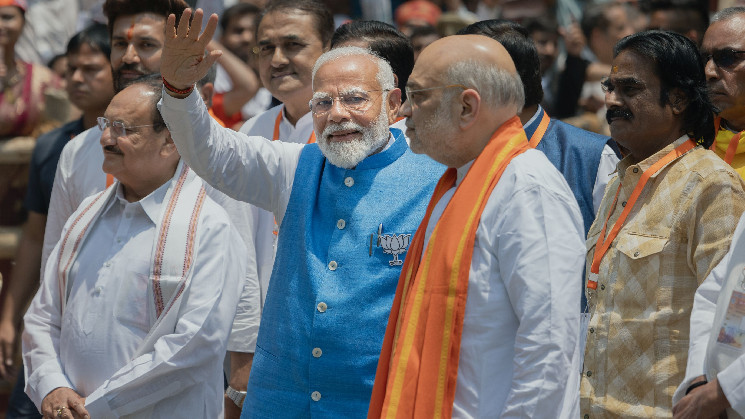India’s election results are underwhelming for Prime Minister Narendra Modi’s ruling party.
If Modi is able to persuade his allies to stay, the government will continue, albeit with less power.
Crypto was at best a negligible issue for voters and certainly not a political talking point during campaigning in the world’s largest democracy.
India’s voters sprung an election surprise on Prime Minister Narendra Modi’s party, awarding it a smaller share than forecast in preliminary results, sending stock markets crashing and likely pushing crypto legislation further into the future.
While Modi’s Bharatiya Janata Party (BJP) and its allies are poised to return to power, they didn’t hit the supermajority mark of 370 plus seats in India’s 543-seat lower house of parliament, which they predicted. In fact, the BJP alone did not hit the halfway mark of 272, which it had comfortably crossed in the 2019 election. The result hands kingmaking power to his allies, and the opposition led by the Indian National Congress could attempt to lure them away.
On June 1, exit polls had predicted a comfortable victory for the BJP and its allies, resulting in record highs for the country’s stock markets. As results trickled in on Tuesday, stocks lost more than $350 billion in value in a matter of hours. The Nifty and the Sensex sank as much as 8.5% at one stage, before recouping some of the declines.
“The election results were a true black swan event that no one saw coming,” said Rajagopal Menon, vice president of Indian cryptocurrency exchange WazirX. “In the short term, markets will remain jittery as they despise instability. Once the new government takes office, things should return to normal.”
Crypto was at best a negligible issue for voters and certainly not a political talking point during campaigning in the world’s largest democracy. The results, whatever they would have been, were not expected to immediately affect crypto policy in the nation, and its current restrictive rules were expected to stay in place. India has implemented a tax of 1% deducted at source on every crypto transaction, the primary concern for the industry.
Modi’s government had also prioritized framing crypto policy with global consensus during its presidency of the Group of 20 nations last year.
Now, any plans for comprehensive crypto legislation, the industry’s next biggest hope, are likely to be kicked further down the road, given the need to solidify a governing coalition and accommodate partners’ policy concerns as a priority. It’s possible India could see a change in one of the most important positions that influence crypto policy – the role of Finance Minister, currently held by Modi’s colleague Nirmala Sitharaman.
“On the crypto regulation front, nothing changes significantly,” Menon said. “India is a signatory to the G20 ministerial declaration, which outlines a clear roadmap for regulations by 2025. Things will start heating up towards the end of the year for crypto regulations.”
In December 2023, a senior BJP lawmaker told CoinDesk he didn’t expect comprehensive legislation for the sector till mid-2025. The opposition has barely indicated a policy route for the Web3 ecosystem.
Neither the BJP nor the Indian National Congress mentioned the words cryptocurrency, blockchain or Web3 in their manifestos.
Read More: What’s at Stake for Crypto in India as the World’s Largest Democracy Is in the Midst of Its National Election?
Read the full article here









